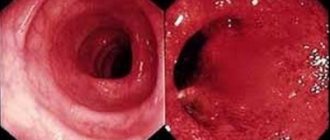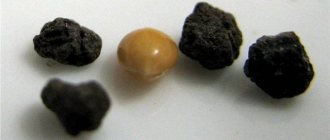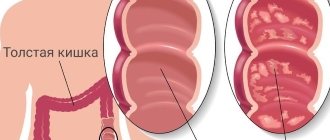Tags:
gastrointestinal diseases, colitis
5/5 — (8 votes)
Colitis is one of the most common pathologies of the gastrointestinal tract. It is an inflammatory disease of the large intestine (or rather, its mucous membrane) with pronounced symptoms , which we will talk about later. The disease can be complicated by inflammatory processes in the stomach and small intestine . It often accompanies some other acute and chronic diseases (influenza, pneumonia, typhoid, mumps, malaria, etc.).
It happens that this disease, due to similar symptoms, is confused with irritable bowel syndrome and for this reason is sometimes misdiagnosed. But since irritable bowel syndrome is not associated with the colon, then, accordingly, it cannot have anything in common with colitis.
Colitis
“Hand in hand” with dysbiosis
There are two forms of colitis - acute and chronic . In both the first and second cases, the infectious component plays a special role in the occurrence and development of the disease - most often bacterial dysentery . It can be triggered by other representatives of pathogenic microflora (for example, coli bacteria, staphylococci, streptococci, bacteria of the Proteus group, etc.). In other words, colitis goes “hand in hand” with dysbacteriosis. Inflammation can also be caused by previous intestinal infections and poor diet, as well as inadequate therapy with various medications. As practice shows, the causes of inflammation are indeed multiple. Let's summarize the main factors :
- infection in the gastrointestinal tract;
- infection with salmonella, staphylococci and other pathogenic microflora due to consumption of poor-quality food;
- the presence of worms (but not in all cases);
- inadequate, monotonous diet (mainly carbohydrates);
- allergies to certain types of food;
- chronic constipation;
- alcohol abuse;
- neglect of personal hygiene rules (for example, touching food with dirty hands);
- long-term use of certain antibiotics that can provoke dysbacteriosis;
- intoxication (poisoning with lead, arsenic and its preparations, mushrooms);
- nervous and emotional tension, stress.
Colitis ulcerosa - all Stages
Classification
There are several types of colitis:
- Ulcerative. Experts still find it difficult to name specific mechanisms for the development of this disease. It is known that the risk is increased by hereditary predisposition, as well as infectious diseases of the gastrointestinal tract.
- Infectious. Develops after infection with pathogenic and opportunistic microorganisms.
- Ischemic - occurs against the background of damage to blood vessels - the branches of the abdominal aorta, and the blood supply to the intestine is disrupted.
- Toxic. Occurs against the background of poisoning with various chemicals, including uncontrolled use of medications.
- Radiation is a consequence of radiation sickness. Anyone who works in an area of high radiation exposure, as well as patients receiving radiation therapy, are at risk.
- Spastic - the exact causes have not been established.
- Microscopic – lymphocytic, collagen. Inflammatory changes are diagnosed only by histological examination.
Symptoms and treatment of colitis depend on the type of colitis diagnosed.
Acute colitis: causes, symptoms, treatment
This form of the disease is caused by staphylococci, streptococci, salmonella and dysentery microorganisms . It also occurs as a result of common infections (influenza, acute respiratory viral infections, acute respiratory infections, measles), allergies or intolerance to certain medications (usually antibiotics). Often, with acute colitis, the stomach and small intestine become inflamed. As a result, according to the “domino principle,” the normal functioning of other organs of the gastrointestinal tract is disrupted. Depending on the nature of the damage to the large intestine, doctors diagnose several types of acute colitis, namely: catarrhal, ulcerative, erosive, and sometimes fibrinous .
The main symptoms include:
- cramping abdominal pain and bloating;
- the presence of mucus and blood in the stool;
- diarrhea (diarrhea).
The disease usually begins suddenly and, as a rule, with a bowel disorder. Patients feel sick and have no appetite . I am tormented by vomiting and constantly thirsty. They complain of general weakness, a sharp deterioration in health and fever . However, vomiting and diarrhea have their advantages: doctors attribute these manifestations to protective reactions. That is, in this way the body tries to get rid of the poisons that have gotten inside.
Symptoms of acute colitis may depend on the location of the inflammation. For example, when the left half of the colon is affected, pain manifests itself most sharply. Before defecation, they usually intensify and radiate to the perineum and sacrum. Stools are very frequent, up to 20 times a day (sometimes more). The stool has an uneven consistency: dense masses “float” in blood or copious mucus. The areas of the descending and sigmoid colon are painful to palpation. This is where rumbling and splashing sounds are detected.
Colitis
This symptomatology can manifest itself over several weeks and, if left untreated, the acute form usually becomes chronic. Such undesirable developments can be prevented with timely assistance.
Thus, treatment of acute colitis includes the following measures :
- drinking plenty of fluids to replenish fluid losses in the body . It is recommended to drink a specially prepared solution that is well absorbed by the intestines: add a teaspoon of salt and seven to eight teaspoons of sugar per liter of warm boiled water. You can drink mineral water and weak tea, but coffee is undesirable because it affects intestinal motility and increases diarrhea. In some severe cases, fluid is administered intravenously.
- therapeutic fasting for one to two days. Then a strict diet is indicated until the symptoms of the disease completely disappear.
- taking activated carbon. Prescribed for the absorption of toxins in the large intestine.
- taking enzyme preparations, enveloping and adsorbent substances.
- physiotherapeutic treatment.
Diagnostics
Scatological research
There is a large amount of mucus in the stool; microscopic examination reveals red blood cells and white blood cells. Bacteriological examination of stool makes it possible to detect disorders in the large intestine - opportunistic microflora, changes in normal microflora (dysbacteriosis).
X-ray examination
X-ray examination (irrigography) is necessary to localize the process, record changes in the relief of the mucous membrane, dyskinesia, and distinguish colitis from other diseases.
Sigmoidoscopy and colonoscopy
These studies reveal catarrhal (hyperemic intestinal wall, swelling, mucous plaque) and atrophic (pallor, thinning) changes in the mucous membrane of the colon.
About the causes, symptoms and treatment of chronic colitis
Chronic colitis is a disease where the leading provoking factor is the presence of infection in the gastrointestinal tract . Its manifestations are “many-faced”. It occurs in the form of periodic exacerbations. The latter occur as a result of consuming foods that irritate the colon; manifestations of allergies; long-term use of various antibiotics; general fatigue.
The main symptoms of chronic colitis include:
- cramping pain in the abdomen (but does not always occur, more often accompanying the act of defecation);
- diarrhea alternating with constipation;
- secretion of mucus (in some cases mixed with blood);
- lack of appetite;
- nausea, belching of air, unpleasant taste in the mouth;
- a feeling of heaviness and distension in the abdomen (as a result of flatulence);
- a feeling of pressure in the epigastric region (often manifests itself in connection with gastritis);
- deterioration in general health (weakness, poor sleep, headaches, irritability, depressed mood).
Chronic colitis sometimes occurs as a consequence of functional disorders of the intestines (for example, with prolonged constipation). The causes also include dyskinesia (impaired motor function), which is associated with reflex effects from the gallbladder, bladder, prostate and other organs.
The basis for the treatment of chronic colitis (regardless of its etiology) is a dietary regimen. Drug therapy is effective only in cases where the cause is clearly established. When constructing a diet, the nature of dyspepsia (putrefactive or fermentative) and the state of the pancreas and its secretory function are taken into account . A too strict diet is not needed, as there is a risk of exhaustion and the development of hypovitaminosis, which will only complicate the course of colitis.
Strict dietary restrictions are allowed only during periods of exacerbation of the disease . Then foods that irritate the intestines both mechanically and chemically are excluded . Food is consumed boiled or pureed. Meals are split (6-7 times during the day). The consumption of table salt is limited (up to 8-10 g). Allowed: non-rich meat broth, steamed cutlets from lean meats, boiled fish (also low-fat), non-acidic cottage cheese, water porridge, juices, jelly. There is a strict taboo on black bread, spicy dishes, and various smoked foods. It is undesirable to eat lard and pork, goose meat and milk, sour cream, eggs, canned food, etc. Patients prone to diarrhea should not eat cold food, and the same applies to drinking.
If chronic colitis is accompanied by constipation, then the diet must include foods to stimulate intestinal function: minced meat, boiled vegetables and fruits.
Etiology and pathogenesis
The cause of chronic colitis is quite often the causative agents of intestinal infections - Shigella, Salmonella, Campylobacter, Yersinia, Clostridia, etc. Chronic colitis can be caused by helminths, protozoa (amoebas, Giardia, Trichomonas, Balantidia), as well as opportunistic and saprophytic flora. When chronic colitis occurs, the pathogen may not be detected, but dysbacteriosis remains, changes not only in the motor and enzyme-secreting functions of the intestine, but also in the structure of the mucous membrane, intensify, which contributes to the chronicity of the process.
Colitis of nutritional origin is quite common. They are caused by a violation of the diet, a monotonous diet containing a large amount of carbohydrates or proteins, a diet devoid of vitamins, frequent consumption of indigestible and spicy foods, and alcohol abuse. There are also “drug-induced colitis”, which occur with prolonged and uncontrolled use of a number of medications (laxatives containing anthraglycosides, antibiotics, salicylates, digitalis preparations, etc.).
Colitis of an allergic nature is possible (with food and drug allergies), and the allergic component is also inherent in the so-called post-infectious colitis, in which there is increased sensitivity to certain representatives of the intestinal microflora, the products of their vital activity and decay.
Colitis can be caused by congenital enzyme deficiency, in particular disaccharidase deficiency, due to constant irritation of the colon mucosa by products of incomplete breakdown of food. A similar mechanism, along with viscero-visceral reflexes, underlies some “secondary” colitis, such as colitis accompanying atrophic gastritis, pancreatitis with impaired exocrine function of the pancreas, and chronic enteritis. Developing dysbiosis contributes to the occurrence of an inflammatory process in the colon, but can also be its consequence, as is secondary disaccharidase deficiency.
In the pathogenesis of the disease, damage to the mucous membrane of the colon as a result of prolonged exposure to mechanical, toxic, and allergic factors is essential. The nervous apparatus of the intestine is involved in the pathological process, which leads to disruption of the motor and secretory functions of the colon and aggravates trophic disorders in the intestinal wall. Dysbacteriosis is of great importance, characterized by a decrease in the number of microorganisms constantly present in the intestine (bifidobacteria, E. coli, lactobacteria), a violation of the ratio of bacteria in various parts of the intestine, increased proliferation of opportunistic flora and the appearance of pathogenic flora. Secondary fermentopathy occurs. All this leads to the development of intestinal dyspepsia, immune disorders with the appearance of autoantibodies to antigens of the colon mucosa. The likelihood of autoimmunization in the progression and chronicity of the process is quite high.
Prevention of colitis
They say that disease is easier to prevent than to treat. Therefore, preventive measures are very important.
Prevention of acute colitis consists of following the norms of proper nutrition and a healthy lifestyle, maintaining hygiene and sanitary rules.
In the prevention of chronic colitis, special attention is paid to the prevention and timely treatment of acute colitis and especially dysentery. A large role in the prevention of diseases of the gastrointestinal tract is played by high-quality nutrition and, accordingly, maintaining the intestinal microflora in a healthy state . Not to mention the good condition of the chewing apparatus and strengthening of the nervous system.
Survey
Colonoscopy
- Cost: 25,000 rub.
More details
Diagnosis begins at a consultation with a gastroenterologist with examination and questioning. The nature of pain and discomfort and their duration play a big role. When diagnosing colitis, a whole range of instrumental studies is used:
- Colonoscopy. The most common endoscopic examination of the intestine.
- Sigmoidoscopy (examination of the rectum and anal area).
- Laboratory examination of stool (scatology, bacterial examination, inflammatory markers - calprotectin and others).
- X-ray examination using a contrast agent (irrigoscopy). Allows you to detect the exact localization of inflammation.
- Biopsy of the mucosa for histological examination. Allows you to clarify the diagnosis and exclude the possibility of a malignant neoplasm, which often manifests itself with the same symptoms as colitis.
Diagnostics is aimed at collecting the maximum amount of data about the disease. The doctor tries to find out the cause (it must be eliminated during treatment) and to clarify the localization of the inflammatory process. The more accurate the examination, the easier it is to choose effective treatment tactics.
Causes
The main causes of ischemic colitis are the following factors:
- atherosclerosis of the lower or upper mesenteric arteries;
- compression of blood vessels, resulting in the formation of a tumor;
- adhesions;
- swollen lymph nodes;
- vascular abnormalities;
- infective endocarditis;
- connective tissue diseases;
- rheumatoid arthritis;
- chronic vasculitis;
- nodular panarteritis;
- microspherocytic anemia;
- aortoarteritis.
Symptoms
Colitis in adults and children manifests itself with two main symptoms: pain and diarrhea. Other signs are not always present. Clinical phenomena directly depend on the type of pathology.
Extended symptoms include:
- bloating;
- against the background of an acute inflammatory process, general intoxication of the body begins, expressed in a rise in body temperature, chills, weakness, cephalgia;
- diarrhea, frequent urge to defecate;
- diarrhea in certain cases provokes hemorrhoids, hence the presence of blood in the stool. This is an alarming sign that requires immediate medical attention;
- against the background of constant and severe diarrhea, dehydration occurs in the body. It is manifested by dizziness, drowsiness, a feeling of dry mouth, decreased tissue turgor, and rare urination;
- nausea and vomiting;
- weight loss;
- increased fatigue.
Symptoms last for several weeks, but with adequate treatment, the malaise gradually decreases. In the absence of therapy, the process of the disease becoming chronic begins, and then the ligaments and muscles begin to suffer. Small vessels enlarge, lesions develop in the form of ulcers and abscesses. The following phenomena are added to the clinic:
- pain;
- diarrhea or, conversely, difficulty with bowel movements;
- flatulence;
- tenesmus;
- decreased appetite;
- feeling of bitterness in the mouth;
- frequent belching, vomiting, nausea;
- the stool takes on a pungent odor.
Our services
The administration of CELT JSC regularly updates the price list posted on the clinic’s website. However, in order to avoid possible misunderstandings, we ask you to clarify the cost of services by phone: +7
| Service name | Price in rubles |
| Sigmoidoscopy | 2 500 |
| Colonoscopy (video colonoscopy) | 7 000 |
| Irrigoscopy | 7 000 |
All services
Make an appointment through the application or by calling +7 +7 We work every day:
- Monday—Friday: 8.00—20.00
- Saturday: 8.00–18.00
- Sunday is a day off
The nearest metro and MCC stations to the clinic:
- Highway of Enthusiasts or Perovo
- Partisan
- Enthusiast Highway
Driving directions







